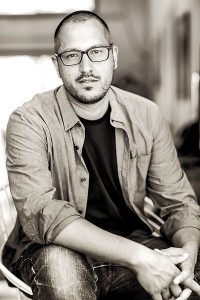It took him years to figure out fiction is about characters
View(s):
Sunil Yapa. Pic courtesy Franco Vogt
Sunil Yapa’s journey to his first novel,Your Heart is a Muscle the Size of a Fist, began with a picture at a protest in Seattle of a woman with long red hair on the pavement on her knees in a crowd.
He thought she looked like she was praying or was in pain. A man leaned over her, tending a wound on her head, while people milled about. Yapa told a journalist from The Rumpus: “I was thinking, what would make this woman risk getting teargassed, getting pepper sprayed, getting beaten, not for her own rights, but for some kid in a sweatshop making shoes in Sri Lanka, or in Bangladesh, or in Vietnam? That’s an amazing thing. I wanted to know what their story was, I wanted to think what would bring someone there, and what about the world had changed that that was something that now was important in the world.”
Your Heart is a Muscle the Size of a Fist was a runaway success, making it on to Time Magazine and Amazon.com’s Best Books of the year, a Barnes & Noble Discover Great New Writers Pick, and an Indies Next Pick and the winner of the 2010 Asian American short story award.
The book follows its characters over the course of a day – the now infamous World Trade Organization protests that took place along the streets of Seattle in 1990–a day that started peacefully and ended in blood.Yapa was working with a big cast of characters, but one of his most challenging was likely writing from the perspective of the police, who were accused of terrible violence.
Yapa speaks about how the police were outnumbered and under-trained. “When I started researching, I knew right away I didn’t want the cops to be an easy villain.” Yapa felt that if the book was to be about empathy, then he needed to challenge himself to empathise. One of his most influential resources turned out to be recordings in the city hall archives of the police radio scanners from all five days of the protest. What he heard helped him see the other side.
“It’s wild because you can hear how it starts out pretty calm, and by day three it’s absolute panic. People talking over each other, yelling in the background, teargas going off, the concussion grenades going off. You can hear they’re scared. Even the most basic research tells you that most of the cops didn’t have any lunch breaks, some hadn’t eaten in eighteen hours, some hadn’t peed in eighteen hours, hadn’t slept. And then I can start to understand a little bit. It’s not an apology or an excuse, but I can start to empathize with being in that situation.”
Yapa’s first draft was very different – for starters, he had 60. (His second had only seven). Yapa has told journalists that his laptop getting stolen forced him to completely reconsider the book. “I was obviously devastated, but it was a blessing…I got really lucky to be able to re-examine it. I don’t know why it took me so long—I think I’m pretty smart, and I had gone to University of Houston, I had gone to London Film School, I had gone to Hunter College, so I had a lot of people teaching me, and I still hadn’t figured out that fiction’s about characters…It took me four years and a lost manuscript to understand that.”
The biracial son of a Sri Lankan father and a mother from Montana, Yapa has lived around the world, including Greece, Guatemala, Chile, Argentina, China, and India, as well as London, Montreal, and New York City. Sunil’s work has appeared in Guernica, American Short Fiction, LitHub, The Multicultural Review and others.



